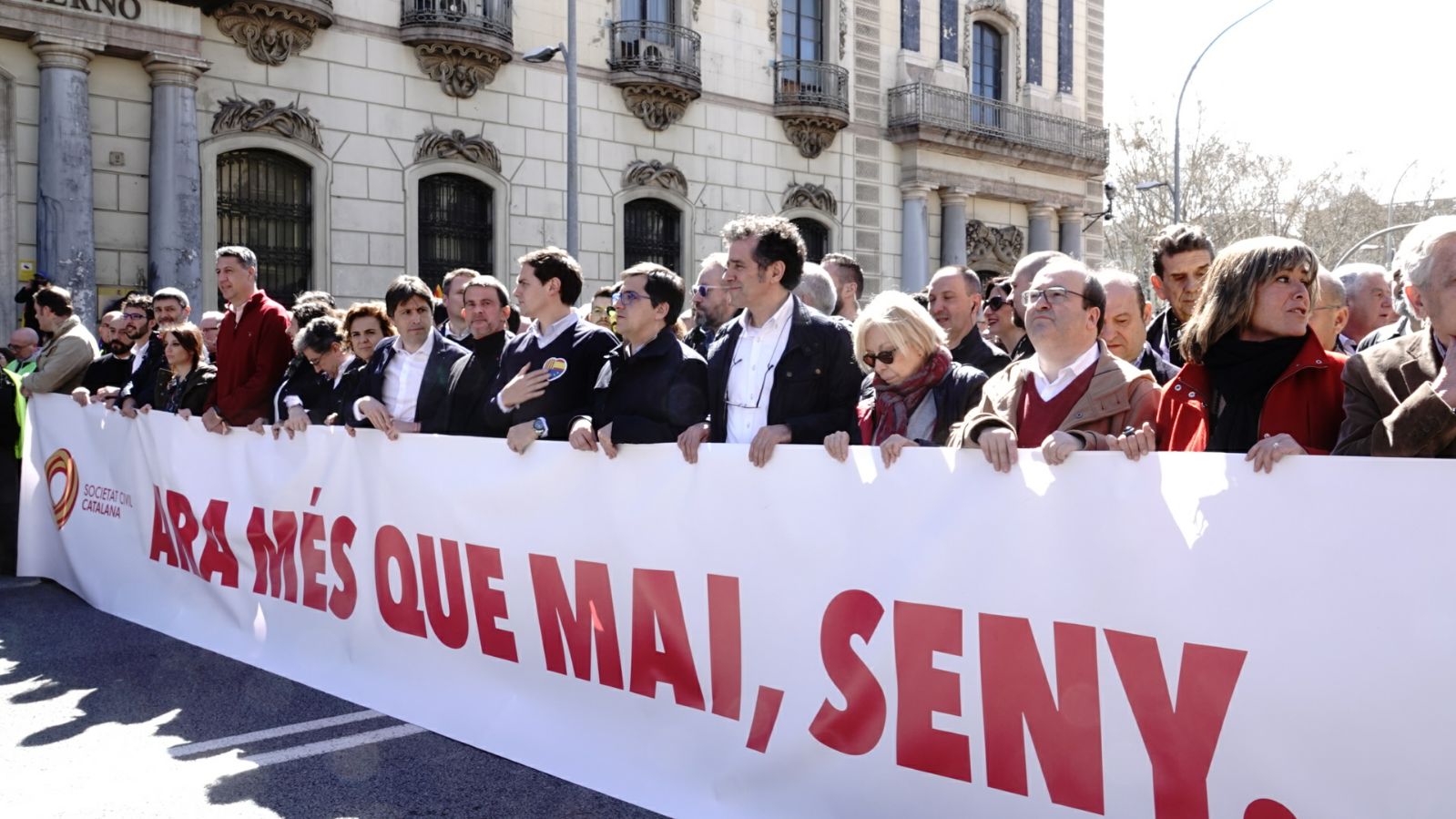A protest march in Barcelona calling for level-headed good sense – the Catalan concept of seny – and also for continued unity with Spain brought only 7,000 unionists to the street on Sunday morning in Barcelona, a relatively small crowd, even compared to recent demonstrations organised by the same group, the pro-Spain organisation Catalan Civil Society. The modest turn-out for the march along central Barcelona's harbourfront Passeig de Colom was in spite of the presence of "star" personalities, including former French prime minister Manuel Valls, as well as leaders from the Popular Party (PP) and Catalan socialists (PSC).

Waving predominantly Spanish flags, along with a few blue EU pennants, some for the imaginary "joke" country of Tabàrnia and the occasional Catalan senyera, the unionists marched to the chant of "Don't fool us, Catalonia is Spain" and the melody of Manolo Escobar's tune "Que viva España". There were also flags combining Spanish colours with the emblem of the Civil Guard, bearing the inscription: "Long live the Civil Guard" - referring to Spain's paramilitary police corps which took part in the repression of the referendum on October 1st last year. Familiar Spanish nationalist slogans were also in evidence, among them the paradoxical "Nationalisms exclude and discriminate", along with frequent chants of "Put Puigdemont in prison".
Iceta, supporting the demonstrators
Before the demonstration, PSC leader Miquel Iceta urged the formation of a Catalan government as soon as possible in order to end the Madrid government's application of article 155 under which it has direct rule over Catalonia. Iceta said that many of those at the event were "indignant" about the lack of a government.

From the moderation of Sardà to the fury of Cañas
Prominent Catalan actor Rosa Maria Sardà took part in the speeches, deviating from the tone that pervaded most of the event. She asserted that the Spanish government also carried much of the responsibility for the Catalan crisis, and affirmed that all nationalisms - all of them - "make people nervous" and censured the political parties and the press from both Barcelona and Madrid. She urged Catalans to reach a new understanding and asked politicians to listen and to establish dialogue. She had had enough, she said, of politicians playing games of "mine's bigger than yours".
Next up to the microphone was former Citizens (Cs) MP Jordi Cañas, who did not seem very content with Sardà's speech and stated that although unionism may have made mistakes, "not everyone carries the same responsibilities". In a ferocious speech, in which he even accused the pro-independence movement of being "racist and xenophobic", Cañas ended by shouting his support for the repression ("They will pay for this", he said) and treated the independence process as having been ended: "They bet against Spain and they lost", he affirmed.
A pro-repression prosecutor and an ex-French PM
Former public prosecutor Carlos Jiménez Villarejo also declared his wish to repress the independence movement: "Those who are pro-independence have been and must be punished for their disobedience - a high price must be exacted from them". He affirmed that nobody can claim a "supposed right to self-determination" and for that reason demanded the abandonment of the independence project. The former public prosecutor stated that the Catalan government's policies were tyrannical and congratulated the judges and public prosecutors for their action against the independence movement.
But the most applauded address was that of the former French prime minister Manuel Valls, who gave his whole speech in Catalan. Valls criticized "those people who have divided families", putting his own as an example. He affirmed that Catalonia without Spain is not Catalonia. And he also said that, in contrast to the values he attributes to the sovereignty movement, "Catalonia is not a closed, xenophobic, racist culture". Valls concluded his words by offering to collaborate with the unionist cause, a proposal received with great applause by the crowd.



